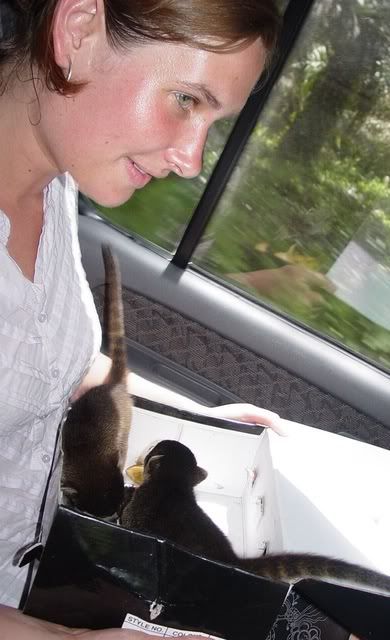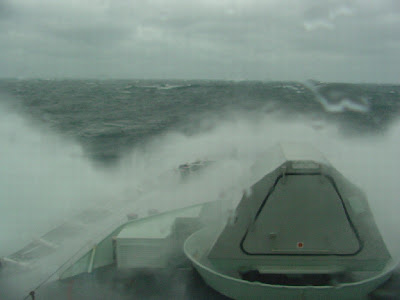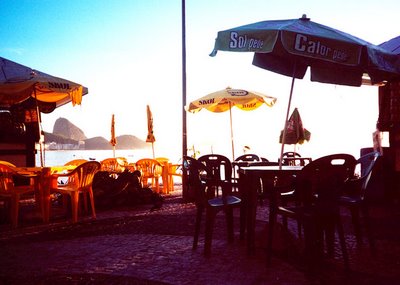On the Road with Evil Gods, Part 2
 Charlie, John, Lea, and myself were driving northeast through Honduras toward the port town of La Ceiba. Accompanying us were the gods Chac and Maximon, and two coatimundi in a cardboard box. Our non-sentient cargo included five deck chairs and many cases of Guinness. We had Port Royal beer and were loaded to our eyeballs. Once we reached La Ceiba we would catch a boat to the Caribbean island of Roatan. The trip had already taken a few unexpected turns, and now the gods, both of whom were believed to have influence over the weather, seemed to be stirring up trouble in the clouds. We let the coatis out of their box and they proceeded to crawl inside our shirts looking for either a comfortable place to sleep or a nipple to suck. My nipples gave no milk, never have sadly. I can't speak for Lea. We fed the coatis some sliced bananas and that seemed to satisfy them. By now Charlie had named them Stan and Ollie, or something to that effect, but I called them Zuko and Blixa and so they shall remain for the duration of this tale.
Charlie, John, Lea, and myself were driving northeast through Honduras toward the port town of La Ceiba. Accompanying us were the gods Chac and Maximon, and two coatimundi in a cardboard box. Our non-sentient cargo included five deck chairs and many cases of Guinness. We had Port Royal beer and were loaded to our eyeballs. Once we reached La Ceiba we would catch a boat to the Caribbean island of Roatan. The trip had already taken a few unexpected turns, and now the gods, both of whom were believed to have influence over the weather, seemed to be stirring up trouble in the clouds. We let the coatis out of their box and they proceeded to crawl inside our shirts looking for either a comfortable place to sleep or a nipple to suck. My nipples gave no milk, never have sadly. I can't speak for Lea. We fed the coatis some sliced bananas and that seemed to satisfy them. By now Charlie had named them Stan and Ollie, or something to that effect, but I called them Zuko and Blixa and so they shall remain for the duration of this tale.We stopped in a town called El Lano, or maybe Santa Rita, to have a new front assembly put on the truck. Hours later the dealer finally told us the Nissan mechanic was out until morning. We had squandered our chance of making La Ceiba before dark, which meant we had to find a hotel. The place we selected was hosting an art opening, and after checking in we milled with local well-to-do types in our sweat-stained clothes and discussed the merits of pieces that were, in truth, uniformly awful. I was quite nervous to look so road worn in such nice surroundings, because the last two nice hotels I’d visited with Charlie had kicked us out. It was his fault both times. Though being escorted off private property by men carrying shotguns is kind of funny in a way, and it makes a good story, I just wasn’t in the mood for the trifecta. So I retreated to my room and stayed there until morning.
 The next day the mechanic replaced the Nissan’s entire front assembly right there in the hotel parking lot, and we were on our way by 10 a.m. We drove John to a small airport from which he planned to charter a flight to Roatan, and the rest of the trip to the coast was uneventful, which meant we were well rested for the ordeal to come. We dropped the Nissan at the car ferry, which you see pictured just above. This is a different ferry than the human ferry. The two facilities are about a mile apart. We thought we’d be able to catch a cab between them, but no such luck. There were plenty of cabs headed the right direction, but they were all carrying humans already. We had no choice but to walk a mile in the heat, toting all our luggage and valuables, and of course Zuko and Blixa in their box.
The next day the mechanic replaced the Nissan’s entire front assembly right there in the hotel parking lot, and we were on our way by 10 a.m. We drove John to a small airport from which he planned to charter a flight to Roatan, and the rest of the trip to the coast was uneventful, which meant we were well rested for the ordeal to come. We dropped the Nissan at the car ferry, which you see pictured just above. This is a different ferry than the human ferry. The two facilities are about a mile apart. We thought we’d be able to catch a cab between them, but no such luck. There were plenty of cabs headed the right direction, but they were all carrying humans already. We had no choice but to walk a mile in the heat, toting all our luggage and valuables, and of course Zuko and Blixa in their box.We reached the ferry building drenched in sweat, and bought tickets as the same bad skies from yesterday returned. We knew it was illegal to carry animals from the mainland to Roatán, because islands have delicate ecosystems and it’s dangerous to introduce new creatures to such habitats. This is an especially serious issue when you consider the case of the Galapagos Islands, which thirty years ago had no inhabitants, but today has 30,000 full-time residents and is overrun with cats, dogs and goats destroying Darwin’s pristine landscape. But on the other hand, horses are not native to America but look what their introduction did. Western movies would be totally different without horses. Cowboys would ride what—ladies in hoop skirts? So mixing species and habitats is a good thing. Unfortunately coatis make high-pitched squeaking noises—if you’ve ever watched Star Trek, they sound exactly like tribbles—so it wasn’t long before the customs folks noticed them.
At this point we had to resort to bribery. Bribery is a common transaction throughout the world, though most people don’t have the guts to try it. But it really works. For example, a bribe had freed me from paying customs duties on my G4 desktop in Mexico. Bribes had spared Charlie from trouble in Guatemala and Honduras. And just so that I don’t unfairly single out Latin America, I should mention that when I worked at Playboy, some employees kept porn movies in their cars because L.A. cops gladly accepted them in exchange for not handing out a ticket. Anyway, Charlie discreetly paid off two customs officials and they let us take the animals on the ferry (in truth it was more complicated than this, and involved a ruse to fool the customs supervisors and so forth, but the details don't really matter unless you want to bribe customs officials yourself, in which case, request info via comment).
 The ferries that run from La Ceiba to the Bay Islands are pretty big. The photo above—which I borrowed from a website since I never thought to take a photo of the ferry—shows a vessel similar to the one we rode, except about thirty percent smaller. Another important difference is that we did not have good weather. No, Chac and Maximon had really been busy and the sky was gray and blustery. Charlie asked me if I was prone to seasickness. I told him no. He said there was a vending machine somewhere that sold motion sickness pills, and that I should buy some if I wasn’t sure. “I’m sure, dude. Why?” He nodded at the water. It was foot high chop, at the most—not even remotely worrisome. “That? That’s nothing.”
The ferries that run from La Ceiba to the Bay Islands are pretty big. The photo above—which I borrowed from a website since I never thought to take a photo of the ferry—shows a vessel similar to the one we rode, except about thirty percent smaller. Another important difference is that we did not have good weather. No, Chac and Maximon had really been busy and the sky was gray and blustery. Charlie asked me if I was prone to seasickness. I told him no. He said there was a vending machine somewhere that sold motion sickness pills, and that I should buy some if I wasn’t sure. “I’m sure, dude. Why?” He nodded at the water. It was foot high chop, at the most—not even remotely worrisome. “That? That’s nothing.”“Just wait till we get out of the bay.”
“I’ll be fine,” I told him. Instead of dismissing Charlie, I should have reminded myself that he does not fret all that much. He was in the Army, where you learn not to waste time and energy stressing. Army command keeps charts of battlefield survivability for various positions. Charlie saw his survivability stats once. For what he did in the Army, survivability in combat is considered to be less than five minutes. So Charlie isn’t a guy who worries much. But I could tell he was worried about this crossing. I ignored him though, because what I said was true—I don't get seasick.
The Roatán ferry carries more than two hundred people, and since we were near the end of the boarding line the only seats available for us were on the top deck, behind the captain’s cabin. I was charged with carrying Zuko and Blixa, and they were really squeaking up a storm now. We took our seats, a horn sounded, hawsers lifted, and we were off. I realized Charlie was right to be worried about the crossing the moment we cleared the breakwater. The sea simply reached up and grabbed us. Reasonably smooth sailing abruptly became a cold windy carnival ride. One of those carnival rides that is designed to make you scream, but with the distinct difference that those rides go three minutes whereas this would last more than two hours. Our places were as far from the surface of the water as could be yet we were soon drenched. The spray was climbing two stories and battering us in our seats. I was lucky I'd worn a rain jacket.
Charlie screamed, “Isn’t this fun?” Or maybe he screamed, “Isn’t this fucked?” It was hard to hear.
It got more fucked. As the water deepened the waves grew higher and more violent. Pretty soon we were porpoising, that is, diving up and down on the waves. The captain's cabin was ringed by large windows, like the cabin pictured in the previous ferry shot, but larger. From where I sat I could see through the cabin. When the ferry crested a wave all I could see was the point of the bow aimed downward toward the ocean. Then we would hit with a boom and a curtain of water would break over the top of the boat. I was getting the worst of the spray where I was sitting. Finally I could take no more. When the ferry began to climb the next swell, I surged from my seat, sprinted astern, crashed down on the wooden deck and wedged myself behind a brace of lifeboats. These boats were stacked about six feet high, so I figured if I sheltered behind them I would at least be safe from the freezing spray.
 I was wrong, of course. Sea winds do crazy things on a ship's deck. If anything I was getting it worse, but I wasn't going to risk moving again. It was possible for people to get around—with difficulty—as long as they kept a deathgrip on the deck rail. But I had to hang onto Zuko and Blixa. I'd risked flying overboard already. I wasn't about to do it twice. By this time the box was soaked and they were clawing through the soggy cardboard. I squeezed my hand inside and stroked the little guys’ heads, but they weren’t having any of it—they wanted out. If they got out, they’d go overboard with the next wave. This was a bad situation.
I was wrong, of course. Sea winds do crazy things on a ship's deck. If anything I was getting it worse, but I wasn't going to risk moving again. It was possible for people to get around—with difficulty—as long as they kept a deathgrip on the deck rail. But I had to hang onto Zuko and Blixa. I'd risked flying overboard already. I wasn't about to do it twice. By this time the box was soaked and they were clawing through the soggy cardboard. I squeezed my hand inside and stroked the little guys’ heads, but they weren’t having any of it—they wanted out. If they got out, they’d go overboard with the next wave. This was a bad situation.By the time we were half an hour into the trip ten to fifteen people on the top deck had vomited. Some managed to drag themselves down the stairs to the main cabin bathrooms, but a few had simply heaved over the rail. Charlie looked intact, but Lea was turning the grey-green of a frog’s belly. The rough ride continued and people continued to barf, one by one. There were about seventy people on the upper deck and I’d estimate fifty of them lost their lunch, some more than once. By now the coati's box had pretty much fallen apart. I quickly shucked my rain jacket, wrapped it around what was left of the box and held on tight. I thought I was drenched before, but without the rain jacket I learned the true meaning of the concept. I got soaked to my underwear. My dreadlocks were so saturated they took until the next night to dry completely. Lea wobbled toward the stairs and disappeared, on her way to barf in the cabin. Someone’s hat flew past and sailed overboard.
Charlie came staggering my way and sat beside me. “Is it any better over here?”
“I seriously doubt it.”
At least we were close to the lifeboats if the worst happened.
To conclude this sad tale, we survived the crossing and straggled into Roatán's port town of Coxen Hole by 7 p.m. More than a hundred people had vomited. Lea had hurled twice. Charlie barely survived. "Five more minutes of that," he said, "and I would have barfed too." And me? I was fine. As I said, I don't get seasick. But that doesn't mean I can't get nauseated by other things. Walking through the enclosed lower deck to disembark the stench of vomit almost smothered me. I would have lost it if I hadn't rudely pushed my way to fresh air.
 So that is the story of how Charlie and I were supposed to smuggle Guinness from Copán to Antigua, but instead ended up smuggling two coatimundi to Roatán. There are two epilogues. First, the Guinness, which did not belong to us and thus went unopened the entire trip, was simply too enticing to resist any longer. We drank it all, every can, over the next week of partying. Our friend Jan, who was the impetus for the road trip in the first place, didn't get a single drop. Second, in an effort to be a good parent Charlie took the coatis to a local vet to see if they perhaps needed shots. The vet gave them shots, and the shots killed them both. So this post is dedicated to poor Zuko and Blixa. If there's a coati heaven, they certainly earned passage by putting up with the likes of me and Charlie.
So that is the story of how Charlie and I were supposed to smuggle Guinness from Copán to Antigua, but instead ended up smuggling two coatimundi to Roatán. There are two epilogues. First, the Guinness, which did not belong to us and thus went unopened the entire trip, was simply too enticing to resist any longer. We drank it all, every can, over the next week of partying. Our friend Jan, who was the impetus for the road trip in the first place, didn't get a single drop. Second, in an effort to be a good parent Charlie took the coatis to a local vet to see if they perhaps needed shots. The vet gave them shots, and the shots killed them both. So this post is dedicated to poor Zuko and Blixa. If there's a coati heaven, they certainly earned passage by putting up with the likes of me and Charlie.






















1 Comments:
This is very interesting story. Surely you feel a little guilty?
Post a Comment
<< Home